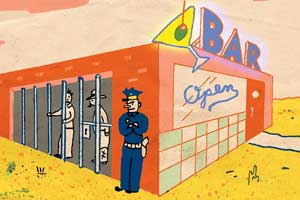
Flickr/<a href="http://www.flickr.com/photos/glennharper/43426112/">glennharper</a>
“So you’ve come to walk through the wake, eh?” one Democratic House staffer quipped shortly after I walked into Molly Malone’s, an Irish pub near Capitol Hill. On Monday, the bar was thronged with soon-to-be-out-of-work staffers for the 60-odd Democratic House members wiped out in the midterms. They’d come together to commiserate, share job-seeking advice—and drown their collective sorrows in more than a few drinks.
Nearly all of the young, soon-departing staffers I spoke to had spent their entire professional lives working on Democratic campaigns or on the Hill. Many were bracing for an indeterminably long walk through the political wilderness. Their coping strategies fell into roughly three categories: venting, rationalizing away the Democrats’ losses, and survivalist-minded resignation.
Venting: There were garden-variety complaints about the conservative wave that had pushed the Democrats out of office (“anti-gay tea partiers—that’s why I’m here,” one woman seethed). But staffers seemed to reserve the most vitriol for the Republican upstarts who had unseated their bosses or pulled off significant upsets.
Take Rick Scott, for instance. “He’s a criminal—a criminal!” sputtered one staffer standing near the bar, raging against Florida’s governor-elect, whose former health care firm was forced to pay out the largest Medicare fraud settlement in US history. “He defrauded all these people of their money, and they turn around and vote for him anyway.” The staffer had spent nearly a month on the campaign trail to vouch for his boss, but voters’ faces just went blank when he tried to persuade them to keep an incumbent Democrat in office. A colleague of his nodded in sympathy, shaking his head at the absurdity of it all: “Obama wasn’t progressive enough—so I’m voting for the tea partiers!”
Rationalization: By far the most popular explanation for the Democrats’ historic losses was the struggling economy—that, at the end of the day, there really was nothing that the Democrats could have done to stem the Republican tide. One staffer predicted that there’d be nothing to stem the tide of anti-establishment voter anger “until the unemployment rate is below 6 percent”—and who knows how long that’ll be.
At least for this election cycle, the consensus was that little that could have been done to save the vast majority of defeated Dems. If losses had been at 30 or 40 seats, you might have seen some second-guessing about political strategy, one Midwestern campaign veteran explained to me. But given the magnitude of the losses, all the best messaging in the world wouldn’t have saved the party. Another staffer, dressed down in a flannel shirt and jeans, broke it down more simply: “If you were a Democrat, you could have run against Satan and you would have lost.”
Resignation: Sure, the outgoing staffers were struggling to sort through the rubble of the Democratic political wipeout, but their most immediate concerns were about, well, their own political futures. One Hill veteran estimated that “over 1500” Democratic staffers on Capitol Hill would soon be out of jobs as a result of the midterm losses, an estimate that included staff for House members and House committees that were being turned over to the new GOP majority. Everyone has since been scrambling to milk their contacts and blanket Washington with resumes. At Molly Malone’s, it quickly became apparent that a job with the Obama administration was among the most coveted positions for departing Hill staffers—the only real place where things were going to get done in the next two years, one staffer informed me. Think tanks, non-profit organizations, and, yes, lobbying firms were also runners-up.
But others seemed less panicked about the job hunt—and even about the prospect that years could pass before the Democrats managed, once again, to control all levers of power in Washington again. The staffer who greeted me when I arrived told me about an epiphany that he’d had at a recent wedding. There, a Democratic sympathizer had laid out a hypothesis: What if the Democrats only came into power every 10 years to clean up the mess that Republicans had left behind? Could he be OK with that? He ultimately concluded that the inevitable turning of the political tide—however long it might take—gave him some consolation.
As for his own future prospects, the staffer said that he might consider going back home to Chicago if he couldn’t find another job in politics. But, deep down, he wanted to do whatever it took to stick around Washington—even if it meant laying low and, say, serving drinks for the next two years. “I know a lot of bartenders,” he assured me.














